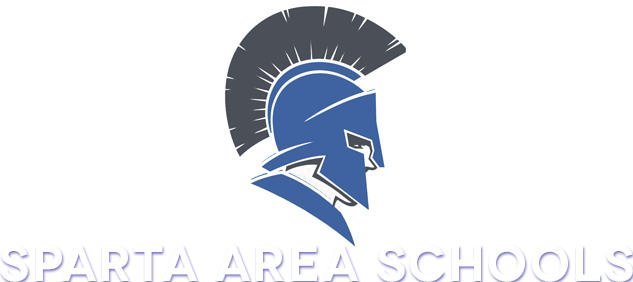Civil Rights Compliance
Title IX
Sparta Area Schools prohibits unlawful sex discrimination, including harassment and retaliation, in any of its education programs or activities in accordance with Title IX of the Education Amendments of 1972 and corresponding implementing regulations. If an employee or student believes that he or she has been discriminated against in violation of Title IX, please reference the District’s Title IX Grievance Procedures below.
Title IX Coordinators
Joel Stoner Tina Mortensen
Superintendent Special Education Director
465 S Union St 465 S Union St
Sparta, MI 49345 Sparta, MI 49345
616-887-8253 616-887-7359
Training
All Sparta Area Schools Staff and Administrators receive Title IX training through our Global Compliance Network module platform.
Title IX Sexual Harassment Comprehensive Training
Sparta School Board Title IX Training
Grievance Procedure
This grievance procedure is for the following:
Section I
Any person believing that Sparta Area Schools, or any part of the school organization, has inadequately applied the principles and/or regulations of (1) Title VI of the Civil Rights Act of 1964, (2) Title IX of the Education Amendment Act of 1972, (3) Section 504 of the Rehabilitation Act of 1973, (4) the Age Discrimination Act of 1975, and (5) Title II of the Americans with Disability Act of 1990 may bring forward a complaint, which shall be referred to as a grievance, to the local Civil Rights ("Coordinator") at:
Mr. Joel Stoner, Superintendent
joel.stoner@spartaschools.org
616-887-8253
465 S Union St
Sparta MI 43945
Section II
The person who believes a valid basis for grievance exists shall discuss the grievance informally and on a verbal basis with the Coordinator, who shall in turn investigate the complaint and reply with an answer to the complainant within five (5) business days. The complainant may initiate formal procedures according to the following steps:
Step 1:
A written statement of the grievance signed by the complainant shall be submitted to the Coordinator within five (5) business days of receipt of answers to the informal complaint. The Coordinator shall further investigate the matters of grievance and reply in writing to the complainant within ten (10) business days.
Step 2:
A complainant wishing to appeal the decision of the Coordinator may submit a signed statement of appeal to the Superintendent of Schools within five (5) business days after receipt of the Coordinator's response. The Superintendent shall meet with all parties involved, formulate a conclusion, and respond in writing to the complainant within ten (10) business days.
Step 3:
If unsatisfied, the complainant may appeal through a signed, written statement to the Board of Education within five (5) business days of receiving the Superintendent's response in Step 2. In an attempt to resolve the grievance, the Board of Education shall meet with the concerned parties and their representative within forty (40) days of receipt of such an appeal. A copy of the Board's disposition of the appeal shall be sent to each concerned party within ten (10) days of this meeting.
Step 4:
If, at this point, the grievance has not been satisfactorily settled, further appeal may be made to the Office for Civil Rights, Department of Education, Washington, D.C. 20202. Inquiries concerning the nondiscriminatory policy may be directed to Director, Office for Civil Rights, Department of Education, Washington, D.C. 20202.
The Coordinator, on request, will provide a copy of the district's grievance procedure and investigate all complaints in accordance with this procedure.
A copy of each of the Acts and the regulations on which this notice is based may be found in the Coordinator's office.
Adopted grievance procedures should be disseminated to students, parents/guardians, employees, organizations, and others to effectively inform them about the processing of grievances. The information must be provided on a continuing basis through the distribution of written materials and/or through periodic briefings.
Dissemination of Grievance Procedures
Written materials through which grievance procedures may be disseminated include:
- Student/parent-guardian/employee handbooks
- Faculty handbooks
- Newspaper/newsletter articles
- Memoranda
- Bulletins
- Pamphlets/brochures
- School catalogs
- Course offering booklets/curriculum guides
Periodic briefings on grievance procedures can be done in:
- Regular student/parent-guardian/staff meetings
- Special meetings or assemblies
- Classroom presentations
- Seminars
Maintenance of Grievance Records
The maintenance of grievance records is recommended for the purpose of documenting compliance. Records should be kept for each grievance filed and, at a minimum, should include:
- The name of the grievance or complainant and their title or status
- The date the grievance was filed
- The specific allegation made and any corrective action requested by the grievant
- The name of the respondents
- The levels of processing followed and the resolution, date, and decision-making authority at each level
- A summary of facts and evidence presented by each party involved
- A statement of the final resolution and the nature and date(s) of any corrective or remedial action taken
Local Civil Rights Coordinator
Mr. Joel Stoner, Superintendent
joel.stoner@spartaschools.org
616-887-8253
465 S Union St
Sparta MI 43945




